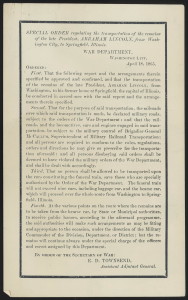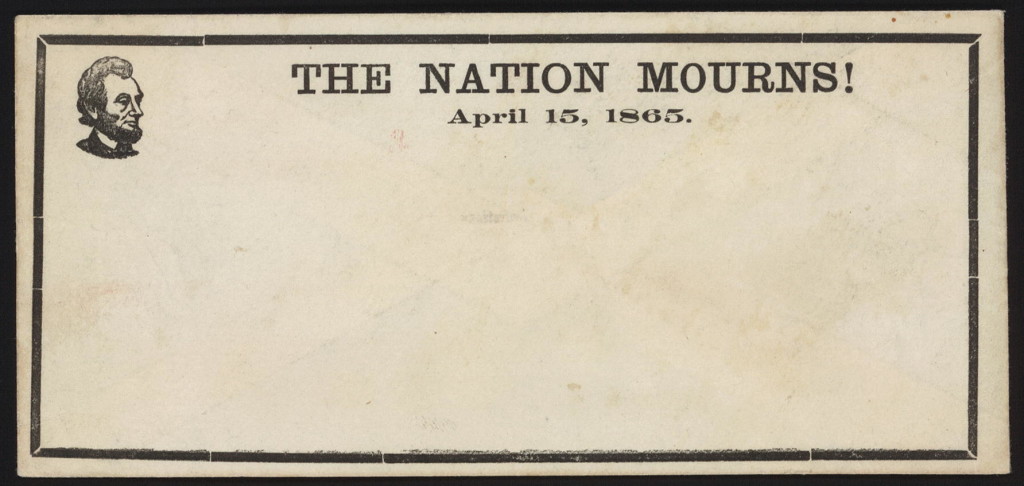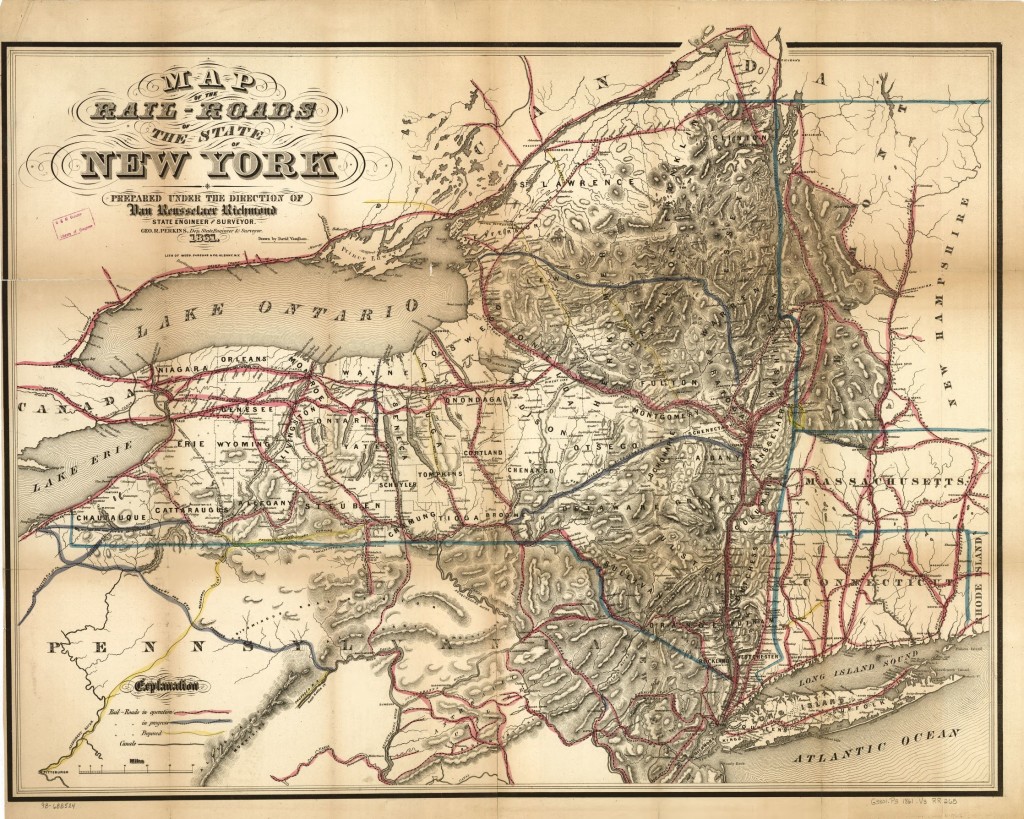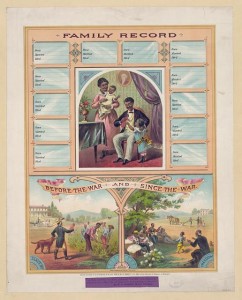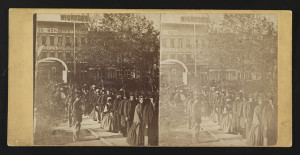
mourners in Springfield May 3 0r 4, 1865
From The New-York Times May 5, 1865:
THE BURIAL.; President Lincoln Again at His Western Home. The Mortal, Four Years Absent, Returns Immortal. Close of the Grandest Funeral Procession in History. Two Weeks’ Solemn March Among Millions of Mourners. The Place of Sepulture and the Last Ceremonies. Elequent Funeral Oration by Bishop Simpson. Touching Manifestations by Mr. Lincoln’s Neighbors. SECOND DISPATCH. from the portico of the Capitol. BISHOP SIMPSON’S ADDRESS.
SPRINGFIELD, Ill., Thursday, May 4.
The already large number of visitors who have been called here to view the remains of the late President LINCOLN, was increased last night and this morning by numerous arrivals from all quarters.
The remains will be accompanied to the vault by a military and civic procession.
The ground selected for the burial is exceedingly beautiful.
The weather is clear and calm.
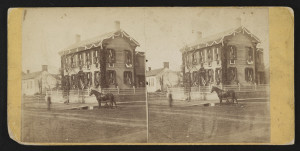
The Lincolns’ Springfield home draped in mourning May 4, 1865
SPRINGFIELD, Ill., Thursday, May 4.
Large numbers have continued to visit the former residence of the late President, on the corner of Eighth and Jefferson streets. It is hung with mourning without, and tastefully decorated within.
Large delegations from the adjoining States and neighboring settlements arrived through the night, and this morning the hotels are overflowing. Some of the visitors are being entertained by the citizens, while thousands of others are unable to find accommodations.
The weather is warm and the sun unclouded. Everybody in Springfield are on the streets. The State House continued to be visited. At 11 o’clock last night, the ladies of the Soldiers’ Aid Society laid upon the coffin a beautiful cross of evergreens, studied with rare flowers. Other similar tokens have been contributed to-day.
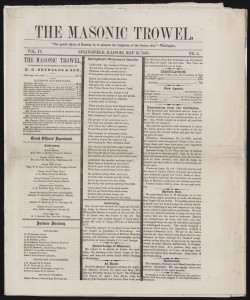
Springfield welcomes Mr. Lincoln home
At noon, twenty-one guns were fired, and afterward, single guns at intervals of ten minutes. About noon, the remains were brought from the State House and placed in the hearse, which was from St. Louis, and was used at the funerals of Hon. THOMAS H. BENTON, Gen. LYON and Gov. GAMBLE. The hearse was surmounted by a magnificent crown of flowers. Meanwhile, a chorus of hundreds of voices, accompanied by a brass band, sang the hymn,
“Children of the heavenly King,
Let us journey as we sing,”
The funeral procession was under the immediate direction of Major-Gen. HOOKER, Marshal-in-Chief; Brig.-Gen. COOK and staff, and Brevet Brig.-Gen. OAKES and staff. The military and the firemen made a fine appearance. The guard of honor consisted of Gen. Barnard, Rear-Admiral Davis, and Gens. McCallum, Ramsay, Caldwell, Thomas, Howe, Townsend and Eakin, and Capt. Field, of the Marine Corps. The relations and family friends of the deceased were in carriages. Among them were Judge DAVIS, of the Supreme Court; the officiating clergyman, Bishop SIMPSON; Dr. GURLEY and others. In the procession were the Governors of six or seven States, members of Congress with their officers, the State and municipal authorities, and delegations from adjoining States. The long line of civilians was closed by the Free Masons, Odd Fellows and citizens at large, including colored persons. The hearse was immediately followed by the horse formerly belonging to Mr. LINCOLN. Its body was covered with black cloth trimmed with silver fringe.
Never before was there so large a military and civic display in Springfield. There were immense crowds of people in the immediate vicinity of the Capitol to see the processio nas it passed, and the people for several miles occupied the sidewalks.
The procession arrived at Oakwood Cemetery at 1 o’clock. On the left of the vault in which the remains of the President and his son were deposited immediately on their arrival, was a platform, on which singers and an instrumental band were in place, and these united in the chanting and singing of appropriate music, including a burial hymn by the deceased President’s Pastor, Rev. Dr. GURLEY. On the right was the speaker’s stand, appropriately draped with mourning.
A short time ago, a piece of property containing sight acres, and located in the heart of the city, was purchased by the citizens for $53,400. The ground is improved with several substantial houses, and trees and shrubbery. It was designed to render the site additionally beautiful and attractive, and to erect thereon a monument to the illustrious dead. A vault has been completed for the reception of the remains, but owing to the wishes of ROBERT LINCOLN, the remains were deposited in Oak Ridge Cemetery nearly two miles from the city. The vault at this place is erected at the foot of a knoll in a beautiful part of the grounds, which contains forest trees of all varieties. It has a doric gable resting on pilasters, the main wall being rustic. The vault is fifteen feet high and about the same in width, with semi-circular wings of bricks projecting from the hillsides. The material is limestone, procured at Joliet, Illinois. Directly inside of the ponderous doors is an iron grating. The interior walls are covered with black velvet, dotted with evergreens. In the centre of the velvet is a foundation of brick, capped with a marble slab, on which the coffin rests. The front of the vault is trimmed with evergreens. The “Dead March” in Saul was sung, accompanied by the band, as the remains were deposited.
Thousands of persons were assembled at the cemetery before the arrival of the procession, occupying the succession of green hills. The scene was one of solemnly intense interest. The landscape was beautiful in the light of an unclouded sun.
The religious exercises were commenced by the singing of a dirge. Then followed the reading of appropriate portions of the Scriptures and a prayer. After a hymn by the choir, Rev. Mr. HUBBARD read the last inaugural of President LINCOLN. Next a dirge was sung by the choir, when Bishop SIMPSON delivered the funeral oration. It was in the highest degree eloquent, and the patriotic portions of it was applauded. Then followed another hymn, when benediction was pronounced by Rev. Dr. GURLEY. The procession then returned to the city.
We have followed the remains of President LINCOLN from Washington, the scene of his assassination, to Springfield, his former home, and now to be his final resting-place. He had been absent from this city ever since he left it in February, 1861, for the national Capital, to be inaugurated as President of the United States. We have seen him lying in state in the executive mansion, where the obsequies were attended by numerous mourners, some of them clothed with the highest public honors and responsibilities which our republican institutions can bestow, and by the diplomatic representatives of foreign governments. We have followed the remains from Washington through Baltimore, Harrisburgh, Philadelphia, New-York, Albany, Buffalo, Cleveland, Columbus, Indianapolis and Chicago to Springfield, a distance in circuit of 1,500 or 1,800 miles. On the route millions of people have appeared to manifest by every means of which they are capable, their deep sense of the public loss, and their appreciation of the many virtues which adorned the life of ABRAHAM LINCOLN. All classes, without distinction of politics or creeds, spontaneously united in the posthumous honors. All hearts seemed to beat as one at the bereavement, and, now funeral processions are ended, our mournful duty of escorting the mortal remains of ABRAHAM LINCOLN hither is performed. We have seen them deposited in the tomb. The bereaved friends, with subdued and grief-stricken hearts, have taken their adieu and turn their faces homeward, ever to remember the affecting and impressive scenes which they have witnessed. The injunction, so often repeated on the way, “Bear him gently to his rest,” has been obeyed, and the great heart of the nation throbs heavily at the portals of the tomb.
BISHOP SIMPSON’S ADDRESS
FELLOW-CITIZENS OF ILLINOIS AND OF MANY PARTS OF OUR ENTIRE UNION: Near the capital of this large and growing State of Illinois, in the midst of this beautiful grove and at the open mouth of the vault which has just received the remains of our fallen Chieftain, we gather to pay a tribute of respect and drop the tears of sorrow around the ashes of the mighty dead. A little more than four years ago, from his plain and quiet home in yonder city, he started, receiving the parting words of the concourse of friends who gathered around him and in the middle of the dropping of the gentle shower he told of the pains of parting from the place where his children had been born and his home had been made so pleasant by early recollections. And as he left he made an earnest request in the hearing of some who are present, that as he was about to enter upon responsibilities which he believed to be greater than any which had fallen upon any man since the days of WASHINGTON, the people would offer up their prayers that God would aid and sustain him in the work they had given him to do. His company left your quiet city. But as it went, snares were in waiting for the Chief Magistrate. Scarcely did he escape the dangers of the way or the hands of the assassin as he neared Washington; and I believe he escaped only through the vigilance of the officers and the prayers of the people; so that the blow was suspended for more than four years, which was at last permitted, through the providence of God, to fall. … Many said: Is it possible to save our nation? Some in our country, and nearly all the leading men in other countries, declared it to be impossible to maintain the Union, and many an honest heart was deeply pained with apprehensions of common ruin, and many in grief, and almost in despair, anxiously inquired what shall the end of these things be. In addition, the wives had given their husbands, mothers their sons. In the pride and joy of their hearts, they saw them put on the uniform, they saw them take the martial step, and they tried to hide their deep feelings of sadness. Many dear ones slept on the battle-field, never, never, to return again; and there was mourning in every mansion and in every cabin in our broad land. Then came a feeling to deepen sadness, as the story came of prisoners tortured to death or starved through the mandates of those who are called the representatives of the chivalry, or who claim to be the honorable ones of the earth; and as we read the stories of frames attenuated and reduced to mere skeletons, our grief turned partly into honor and partly into a cry for vengeance. Then the feeling was changed to one of joy. There came signs of the end of this rebellion. We followed the career of our glorious Generals. We saw our army under the command of the brave officer who is guiding this procession, climb up the heights of Lookout Mountain and drive the rebels from their strongholds. Another brave General swept through Georgia, South and North Carolina, and drove the combined armies of the rebels before him; while the honored Lieutenant-General held LEE and his hosts in a death grasp. Then the tidings came that Richmond was evacuated, and that LEE had surrendered. The bells’ rang merrily all over the land. The booming of cannon was heard. Illuminations and torchlight processions manifested the general joy, and families were looking for the speedy return of their loved ones from the field of battle. Just in the midst of the wildest joy, in one hour — nay, in one moment — the tidings rang throughout the land that ABRAHAM LINCOLN, the best of Presidents, had perished by the hand of an assassin. And then all that feeling which had been gathering for four years in forms of excitement, grief, honor and joy, turned into one wail of woe — a sadness inexpressible; anguish unutterable. … Though the evening was Good Friday, the saddest day in the calendar for the Christian church — henceforth in this country to be made sadder if possible by the memory of our nation’s loss. And so filled with grief was every Christian’s heart that even all the joyous thought of Easter Sunday, failed to remove the crushing sorrow, under which the true worshiper bowed in the house of God. But the great cause of this mourning is to be found in the man himself. Mr. LINCOLN was no ordinary man, and I believe the conviction has been growing on the nation’s mind, as it certainly has been on my own, espcially in the last years of his administration. By the hand of God, he was especially singled out to guide our government in these troublesome times, and it seems to me that the hand of God may be traced in many of the events connected with his history. …
[The report is unfinished in consequence of the bad working of the wires.]

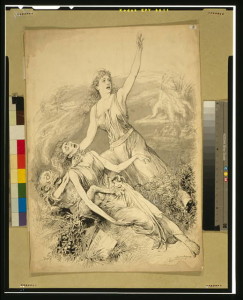
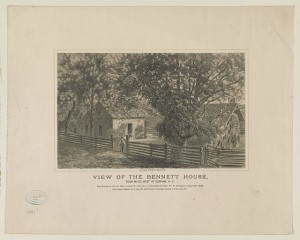
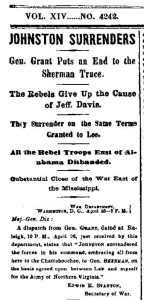
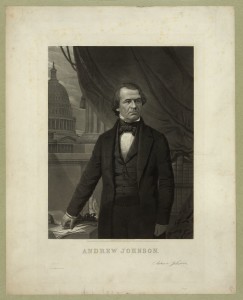



![Satan tempting Booth to the murder of the President ([Philadelphia] : J[ohn] L. Magee, pub., 305 Walnut St. Philada., c1865.; LOC: LC-DIG-ppmsca-23846)](https://www.bluegrayreview.com/wp-content/uploads/2015/05/23846r-231x300.jpg)
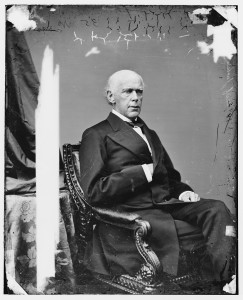
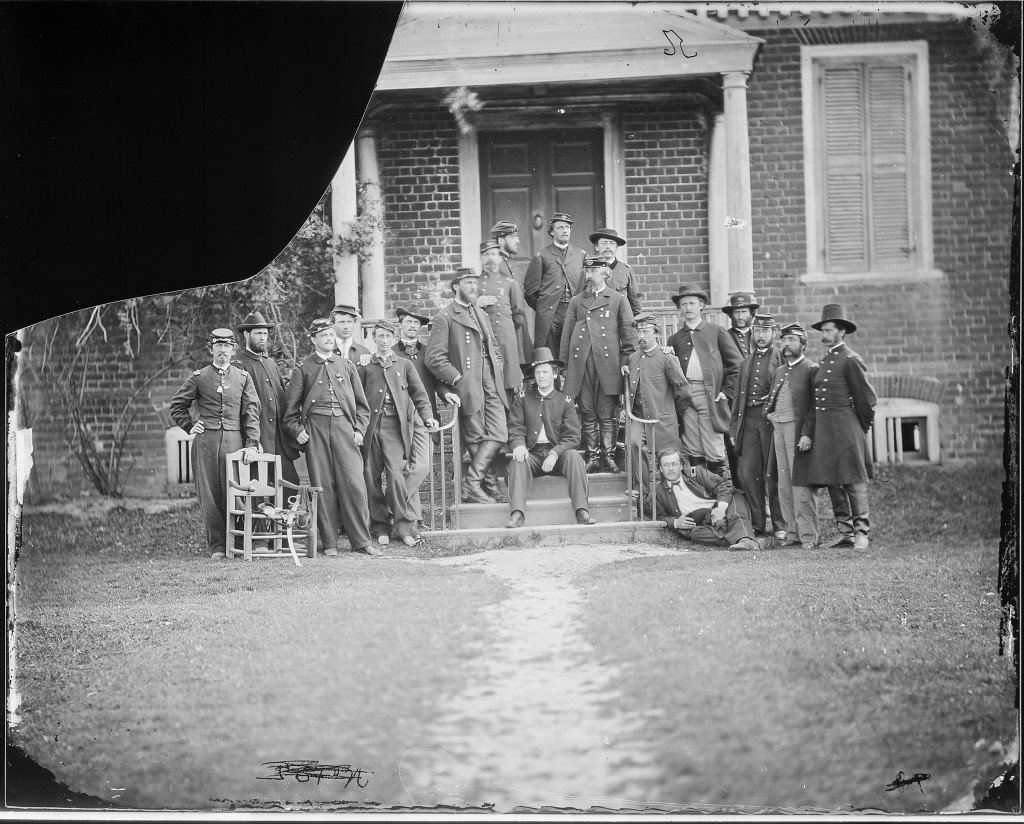
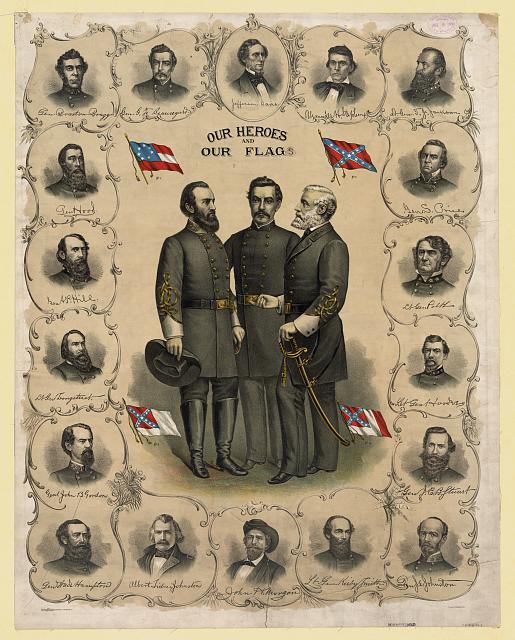
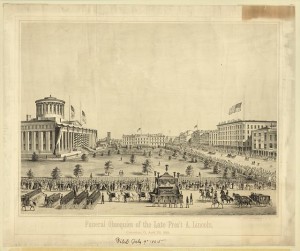
![Funeral obsequies of the late Pres't A. Lincoln, Columbus, O., April 29, 1865 ([Cin.] : Middleton, Strobridge & Col., Lith, Cin., c1865.; LOC: LC-DIG-ppmsca-23853)](https://www.bluegrayreview.com/wp-content/uploads/2015/04/23874r-300x237.jpg)
![[Engine "Nashville" of the Lincoln funeral train] (1865, printed later; LOC: LC-DIG-ppmsca-23855)](https://www.bluegrayreview.com/wp-content/uploads/2015/04/23855r.jpg)
